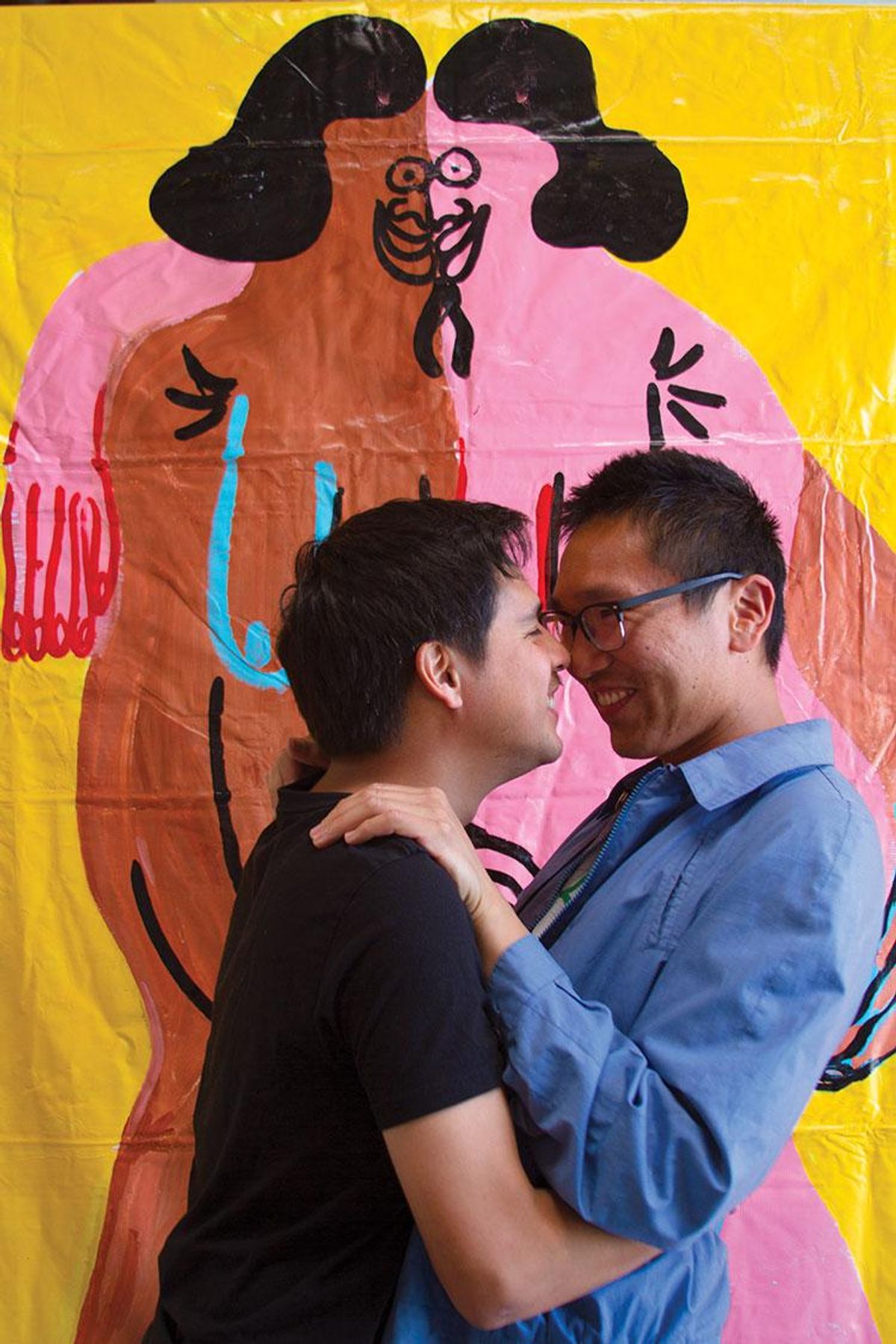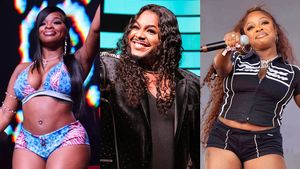The Oakland-based Unity skateboarding collective is making a radical sport, well, more radical. They bring a queer space to the streets, allowing fellow skaters to ride and represent themselves in a sport generally filled by cis hetero white dudes. Though Unity is a skateboarding collective, creators and partners (in both senses of the word) Jeffrey Cheung and Gabriel Ramirez also run a press, do art, and make music under the name.
We chatted with the pair to talk about queer skate days and public rebellion.
Related | Brian Anderson Becomes First Pro Skateboarder to Come Out as Gay
OUT: What drew you guys to skateboarding in the first place? Were you kids when you first started?
Jeffrey Cheung: For me, I started skating when I was in middle school. Yeah, I think middle school through end of high school. It was really one of the only activities I was drawn to. I did it pretty often those years, but I stopped for about ten years after high school until just about last year, just before we started Unity. Gabriel kind of started... When? When we met?
Gabriel Ramirez: Yeah, I actually didn't really grow up skating, but it was something I've always wanted to do. I just never felt the opportunity... I never felt exactly welcome, I never felt that it was something that I could do because I was too afraid of being outed as gay or afraid of experiencing homophobia in that realm. After meeting Jeff and finding out that he was someone that used to skate as a queer person, I just started skating. Jeff had a board and some of the first few times we hung out I skated with him-- or tried to skate. It was nice to be around somebody, especially a queer person, and feel comfortable on a skateboard and not feel intimidated. I kind of really started skating a little bit over a year ago consistently. It's been really cool because I've been able to skate with a bunch of queer people, a bunch of queer friends and skaters all over the Bay. It's been a fun experience for me. I'm not a very good skater, I'm learning how to ollie.
JC: He's really good!
GR: Jeff documents my progress on Instagram.
That's cute!
GR: Yeah. All videos of me falling.

How did you guys meet?
JC: We met through mutual friends about six years ago. We started Unity first as a music project between the two of us... four years ago?
GR: Yeah, I would say 2013.
JC: I also used the name Unity to put out my own zines, then we started publishing other artists' and creatives' work.
GR: Yeah, it mostly just Jeff's work and some of my own stuff, and then we kind of just reached out to some folks we knew in the community here, the DIY or queer scene. We were like, "hey, would you want us to reprint anything of yours or print anything you have?" And it started becoming more of a press that way, we didn't expect it to be, but it happened. That was also 2013? 2014? We were just printing stuff off of our home printer, our laser printer. Really funny, basic stuff.
JC: Once we got a Risograph we began more actively printing other people's work. Then about a year ago, I had the idea for Unity Skateboarding. Unity has gone through many different... It's been the name for a lot of the projects we've done.

Right. How do you guys juggle all those different projects under the Unity name?
JC: At first, I feel like they're kind of separate. We started them separately but kept the same name. I think at this point, there's a lot of overlap. We had the same goal in the different aspects of Unity. As far as the skating and the press, the press definitely has more of a queer focus these days. The music project is probably the one we're least active in, but we're still working with a lot of queer musicians and a lot of our friends are in that community.
GR: We're thinking of ways to incorporate or compile... We know so many queer musicians here in the Bay Area, so we're hoping to expand. Do something creative in that way, maybe have a way to promote or showcase different people here in all the different music projects that are going on. That's something we want to do in the future with Unity, but for now it's on the backburner. We have a lot of other things going on right now.
I'm from Oakland too, so I know it pretty well. Do you think there's something about the sense of community in Oakland or its radical history that helped queer skateboarding or Unity become so successful?
JC: Yeah, definitely! There's a really strong queer and arts and music community here. I feel like things have changed a lot in the Bay Area, as you know, the last five years or so, a lot of folks have moved out due to gentrification. The tech industry is pushing out a lot of artists, but I still feel like there's a very strong community here. With queer skateboarding, when we started, there wasn't really much of a community for that. There were definitely queer skaters, but I feel like everyone was on their own. Now it really feels like there's a much stronger sense of community. There's a new movement of queer skaters and women skaters right now.
You said that you've seen community change for queer skaters, but what further change would you want to see in the future?
JC: I think we're slowly working towards more general inclusion in skateboarding. For example, we do queer skate days as a basis for folks to skate and be comfortable with who they are and their environment in skateboarding. It's not very common with the energy of skate spots or skateparks and skaters. It can be pretty intimidating, it's just cis, heteronormative boys. Maybe one day we won't have to do the queer skate days because that will just be every day, everywhere.
That's the dream.
GR: I think we hope that maybe... It's just skateboarding, but that this will help in skateboarding and out of skateboarding. Hopefully it will help the daily lives of people. We're just hoping that there might be a domino effect from this.
JC: Since we've started this project, we've seen a lot more queer skaters come out and much more visibility for them. We would love to see more POC, QPOC skaters and we really encourage and try to promote that. Being queer in skateboarding is radical in the sense that you're taking up public space, and I feel like queer spaces are often in bars or places like that.
GR: Yeah, places that really aren't in the public eye. I think to take up public space, not only for skateboarding, but for a queer event or gathering, is important as well.
Oh wow! That is so radical. I've never thought about it in that way, and you're right, most queer meetups are in coffee shops or bars or whatever.
JC: Yeah, and I think skateboarding is such a loud and public act. You're skating down the street, and it has a rebellious attitude to it. I love seeing queer people on skateboards and just being together and skating down the street... It makes me so happy. I feel like that's a really radical act, just existing in the world. Visibly.





















































































